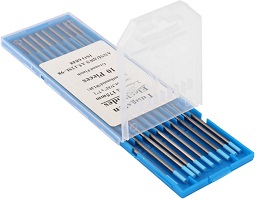Features of TOKO Brand Tungsten Electrodes
Superior performance for TIG welding and specialized applications
Exceptional Arc Stability
- Provides stable arc for precise welding control
- Minimizes arc wander for consistent results
- Ideal for critical welding applications
High Temperature Resistance
- Withstands extreme temperatures up to 3400°C
- Maintains structural integrity under heat stress
- Perfect for high-amperage applications
Long Service Life
- Superior erosion resistance extends electrode life
- Minimal tip degradation during use
- Reduces downtime for electrode replacement
Various Alloy Types
- Available in pure, thoriated, ceriated, and lanthanated types
- Tailored options for specific applications and materials
- Optimized for AC or DC welding based on type
Easy Arc Starting
- Superior electron emission properties
- Consistent arc initiation with minimal effort
- Reduces operator fatigue during extended use
Versatile Applications
- Ideal for TIG welding of stainless steel, aluminum, and exotic alloys
- Widely used in aerospace, automotive, and precision manufacturing
- Suitable for both manual and automated welding systems
Technical Specifications
| Property | Value | Standard |
|---|---|---|
| Melting Point | 3,422°C (6,192°F) | ASTM B760 |
| Density | 19.3 g/cm³ | ASTM B760 |
| Types Available | Pure, 2% Thoriated, 2% Ceriated, 1.5% Lanthanated | AWS A5.12 |
| Diameter Range | 0.5mm - 6.4mm (0.020" - 1/4") | AWS A5.12 |
| Standard Length | 175mm (7") | AWS A5.12 |
| Current Capacity | Varies by type and diameter | AWS A5.12 |
| Tip Preparation | Grinding recommended for optimal performance | - |
| Packaging | 10-piece packs, bulk packaging available | - |

The information contained or otherwise referenced herein is presented only as "typical" without guarantee or warranty, and TOKO Corporation expressly disclaims any liability incurred from any reliance thereon. Typical data and Test results for mechanical properties, deposit or electrode composition and other properties were obtained from a weld produced and tested according to prescribed standards, and should not be assumed to be the expected results in a particular application or weldment. Actual results will vary depending on many factors, including, but not limited to, weld procedure, plate chemistry and temperature, weldment design and fabrication methods. Users are cautioned to confirm by qualification testing, or other appropriate means, the suitability of any welding consumable and procedure before use in the intended application.
